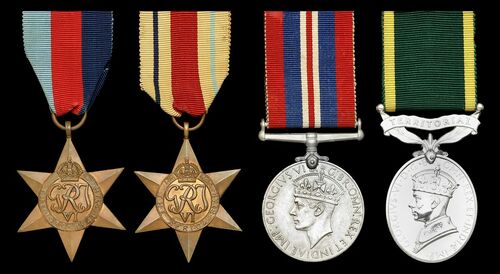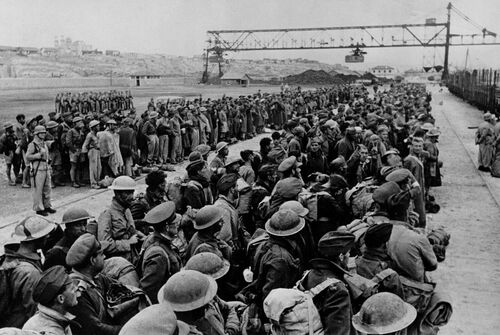Auction: 23113 - Orders, Decorations and Medals - e-Auction
Lot: 507
A 'Battle of Kos 1943' P.O.W. group of four awarded to Private J. E. Sayer, 1st Battalion, Durham Light Infantry, who was wounded during Operation Brevity in May 1941 and later wounded and taken prisoner at Kos when the British garrison was forced to surrender in October 1942, a defeat which resulted in the infamous Kos Massacre
1939-45 Star; Africa Star; War Medal 1939-45, Efficiency Medal, G.VI.R., Territorial (4456722. Pte. J. E. Sayer. D.L.I.), overall good very fine (4)
John Edwin Sayer was born on 11 April 1914 and lived at 2 Short Street, New Shildon, Durham. Working as a coal miner prior to the war he joined the 1st Battalion, Durham Light Infantry on 1 June 1939. This unit was stationed in Tientsin, China when the war began and remained there until January 1940 when they were posted to the Middle East, seeing heavy action there from the off with their inclusion in Operation Compass. They also played a major role in Operation Brevity, a small counter-offensive against Rommel's advancing troops: the plan was to use a mobile column of tanks and jeep-mounted infantry to recapture the Halfaya Pass in preparation for Operation Battleaxe. However the attack failed and Sayer is listed as wounded along with a number of men from his unit on 15 May 1942.
The Battalion joined the Malta Garrison in January 1942 but returned to the desert; in June 1943 they were briefly posted to Syria. With the surrender of the Italians in September 1943 British troops needed to quickly garrison as many Italian possessions which they could before German forces arrived to retake them; the 1st Durhams were one of the units selected to do this, scrambling to take the island of Kos. They succeeded in doing so - however the Germans were not far behind...
The counter-attack began early on 3 October 1943 with landings at a number of points on the island: outnumbered and facing a well-equipped enemy including 'Brandenburger' special forces units, the defenders - composed mostly of the D.L.I. - were on the back foot. By evening German forces on the island numbered 4,000, heavily outnumbering the British who had run out of anti-aircraft ammunition.
The Battle ended at 04:00 the next morning with the British capitulating; the last to surrender were the men of 2909 Squadron RAF Regiment who did so on 8 October. It was in the wake of the battle that the German General, Friedrich-Wilhelm Müller, ordered the execution of over 100 Italian officers who would not side with their former allies. He was later to earn the nickname the 'Butcher of Crete' and was executed by the Greek Government for his crimes on 20 May 1947.
Sayer was again wounded during the savage fighting of 3 October and was taken prisoner with the rest of his battalion. Taken first to Mulberg IVB prisoner of war camp, he was transferred in December 1943 to Bitterfield work camp. His prisoner of war questionnaire notes an interesting occurrence, stating:
'I was working in a Brick factory for three or four months at Bitterfield with four more of our boys, although two of them were threatened with a revolver by the man in charge who is a nazi the remainder of us got on very well with him. I got a dose of flu there and was looked after by him.'
Sayer was released in April 1945; sold together with copied research comprising P.O.W. questionnaire , casualty lists and P.O.W. lists.
Subject to 20% VAT on Buyer’s Premium. For more information please view Terms and Conditions for Buyers.
Sold for
£190
Starting price
£80







